

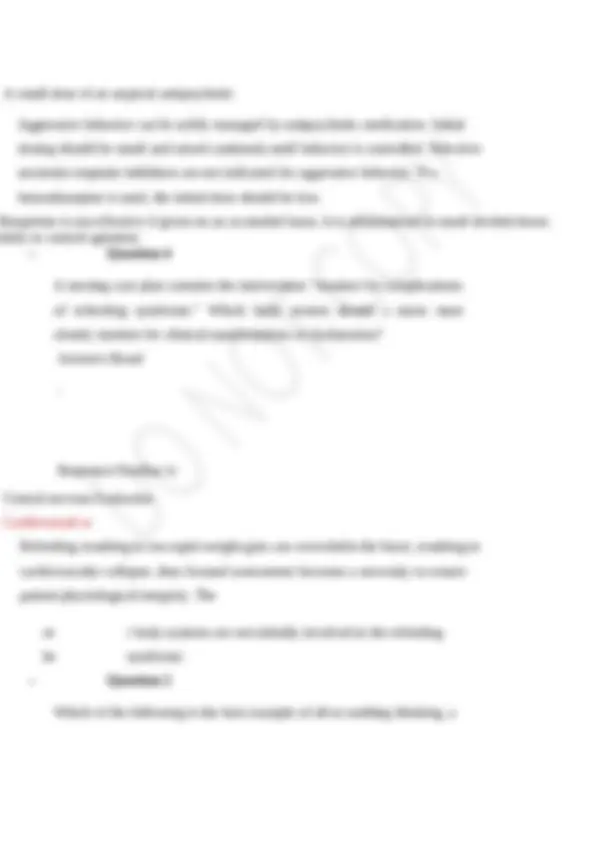

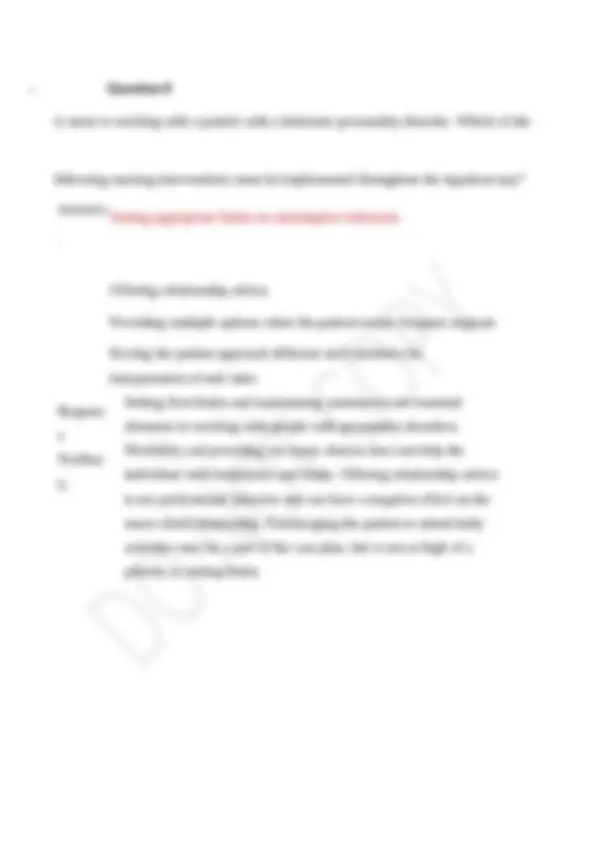
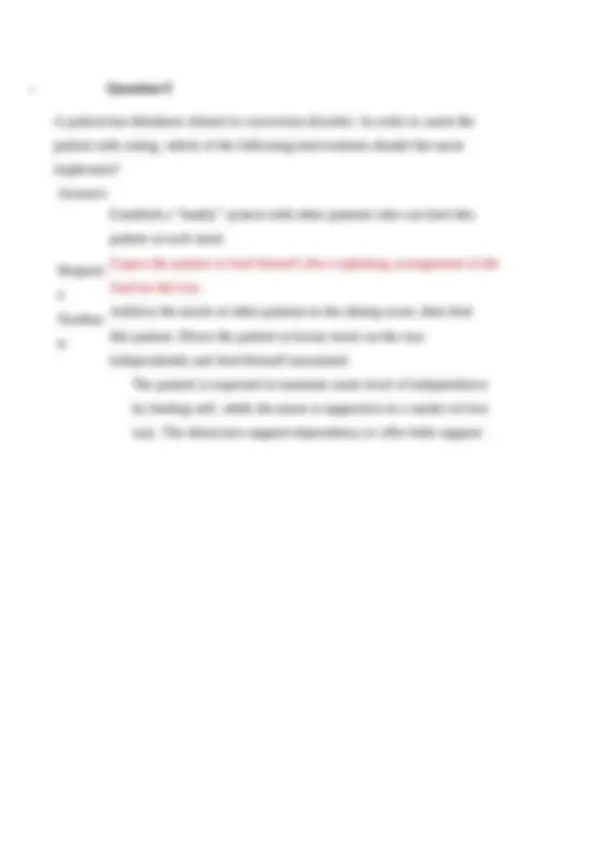
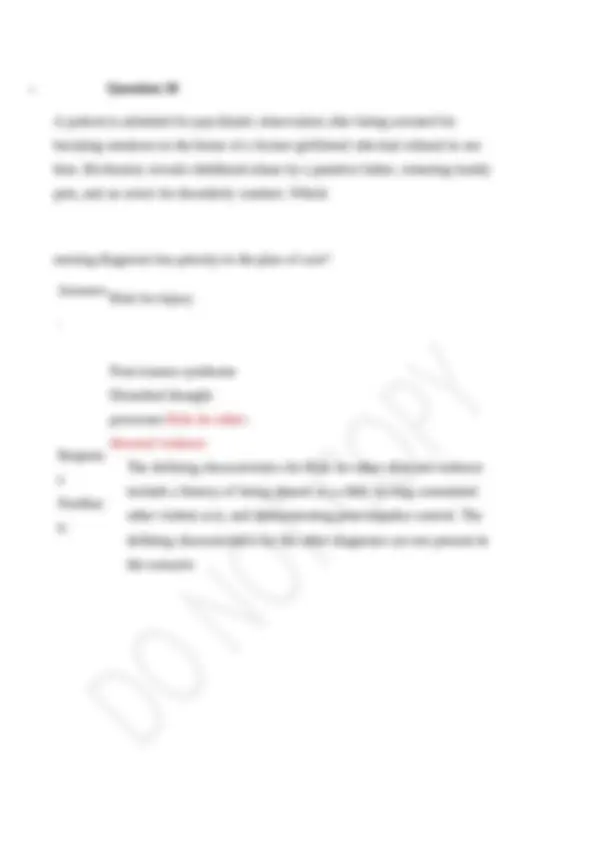
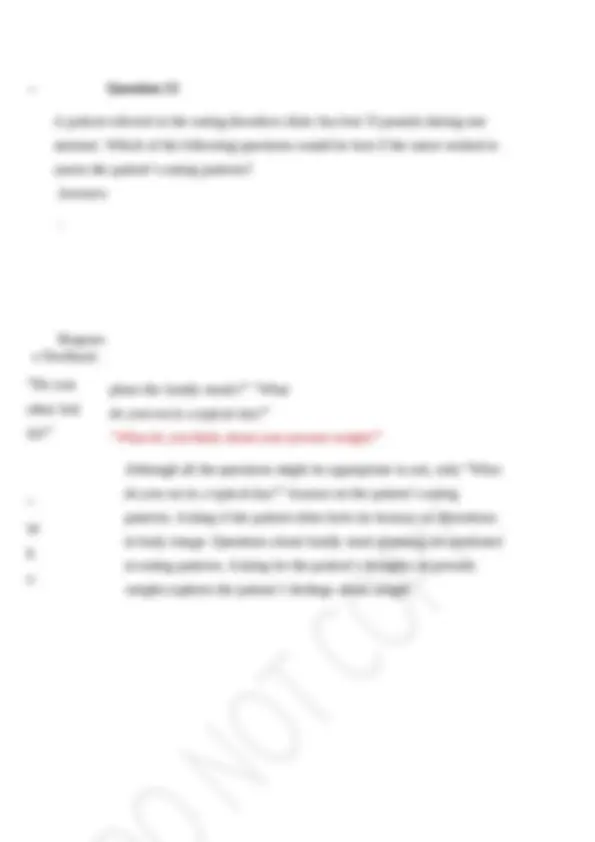
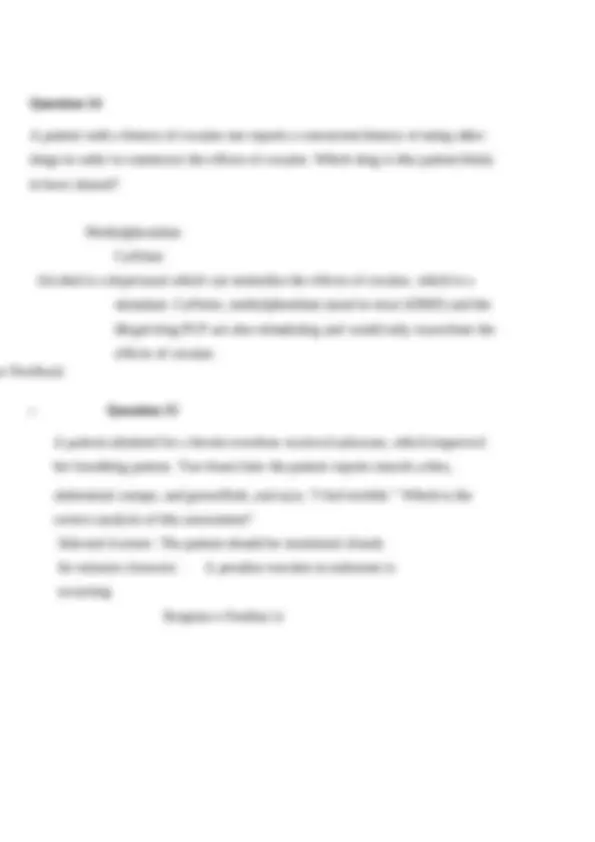
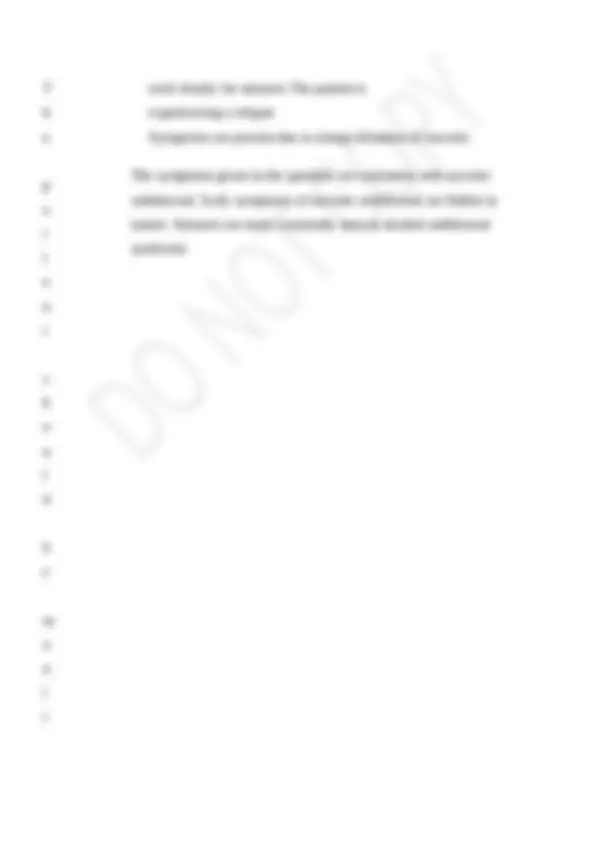
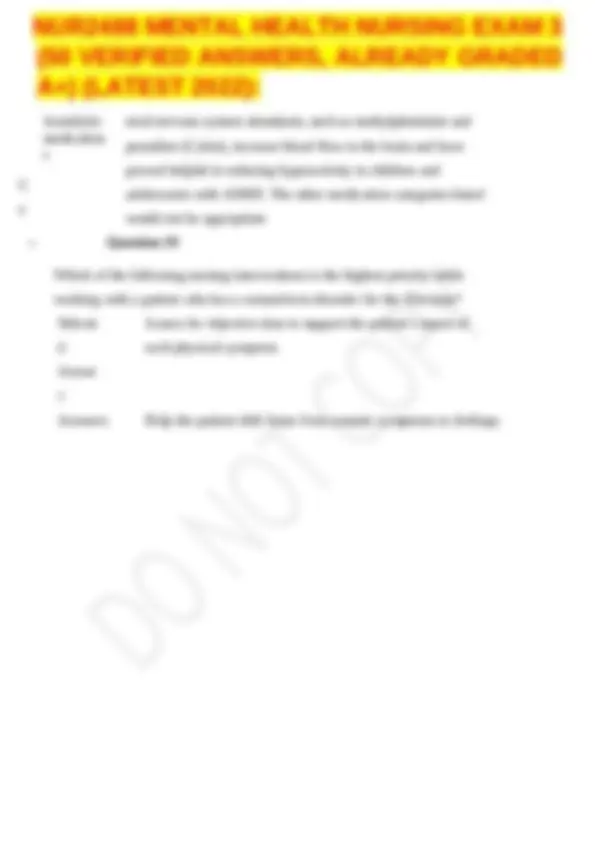
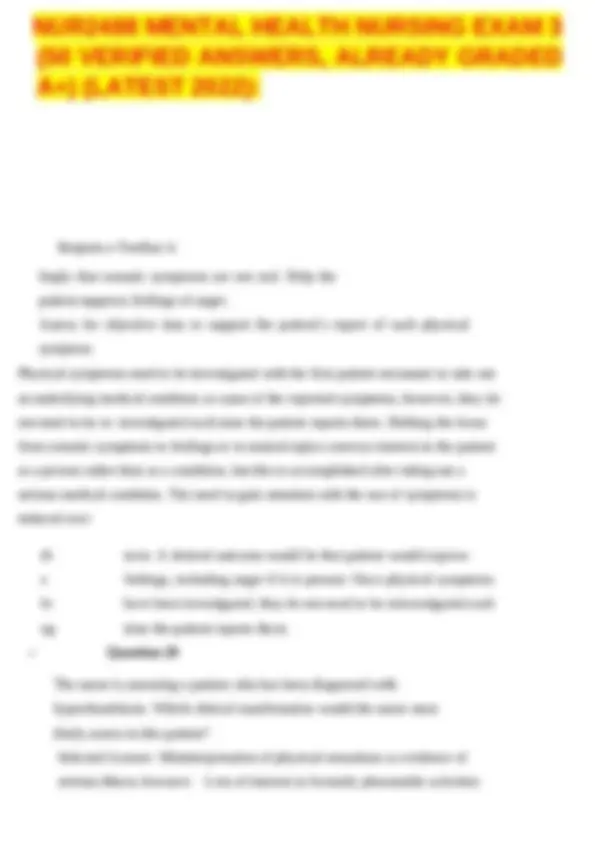
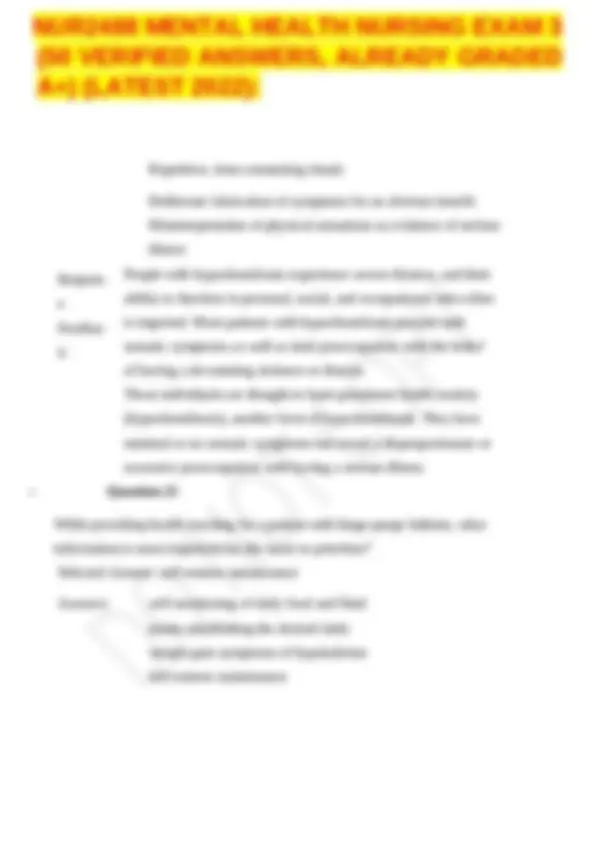
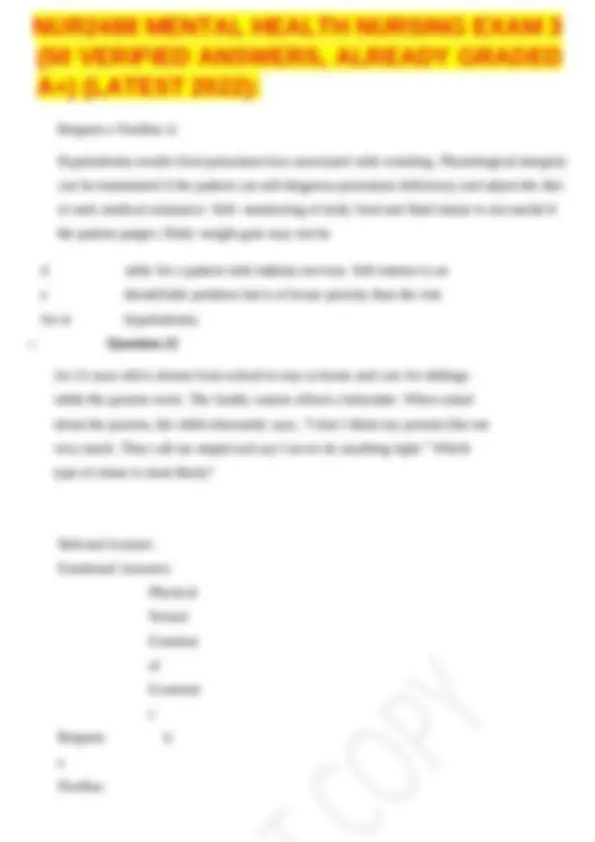
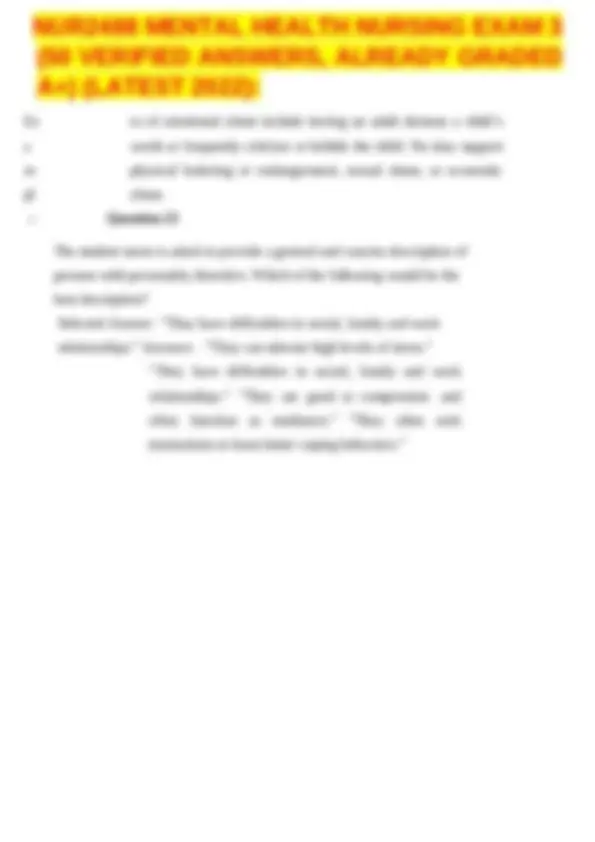
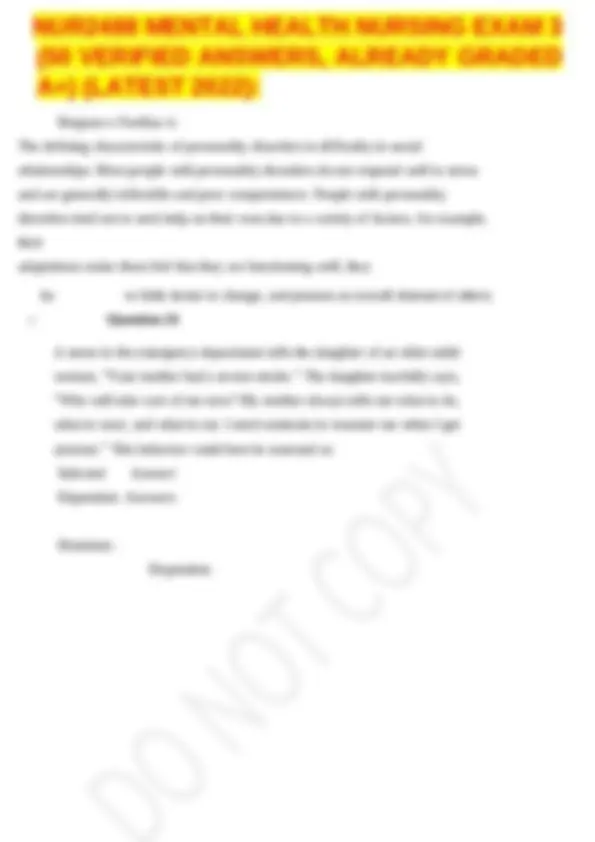
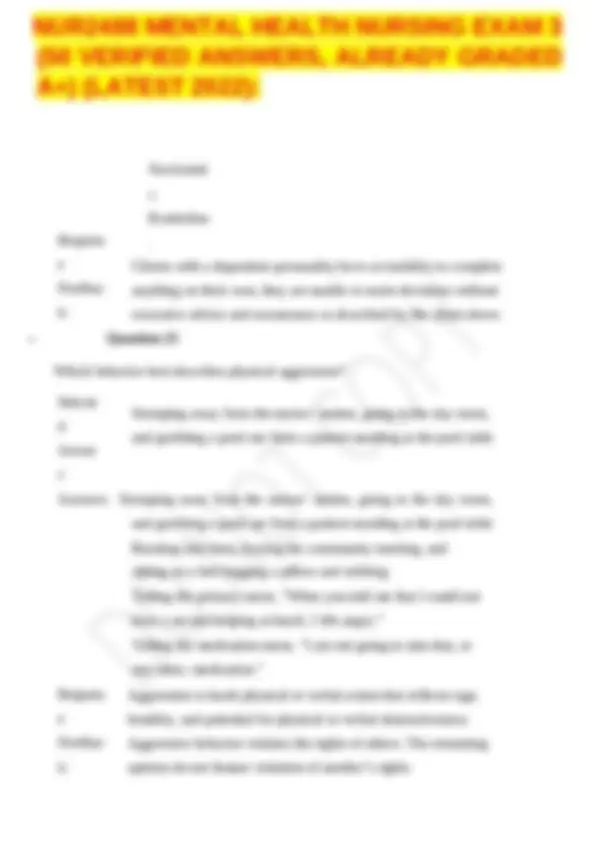
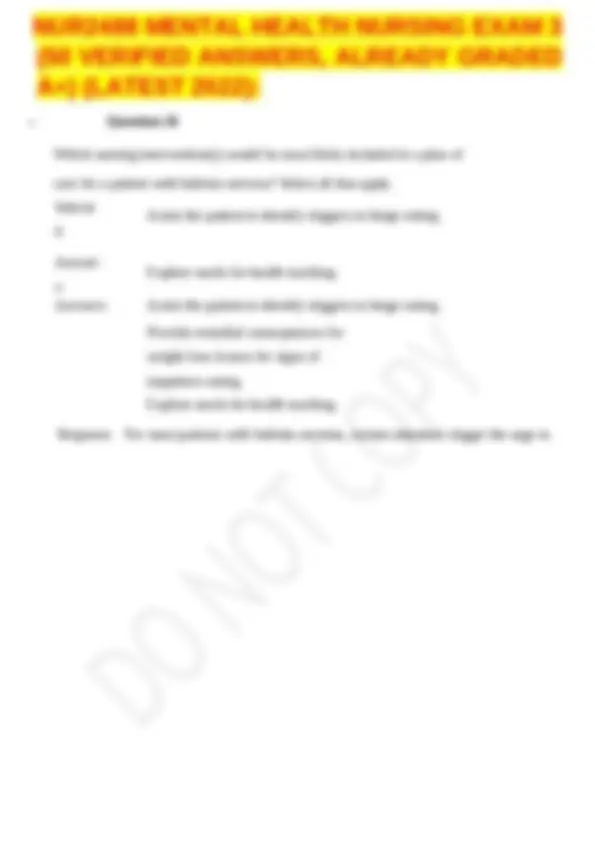
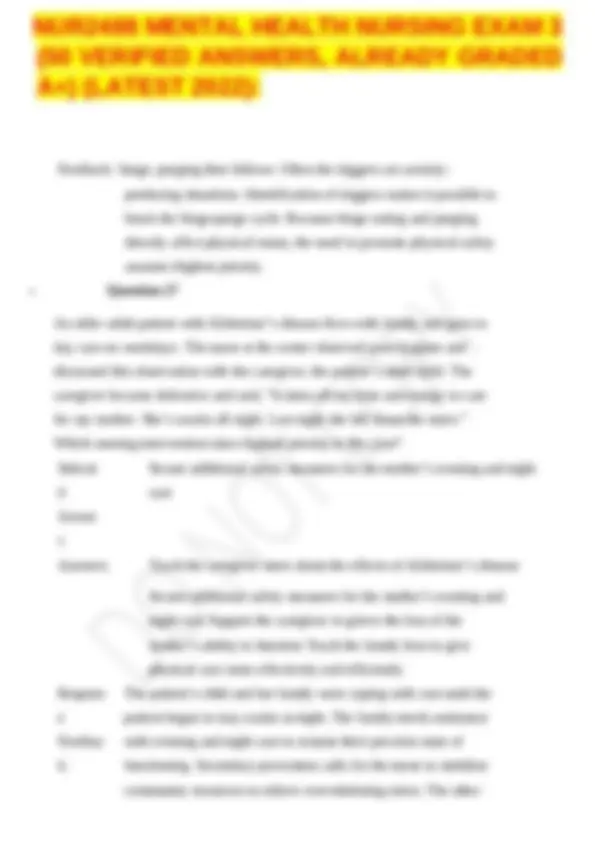
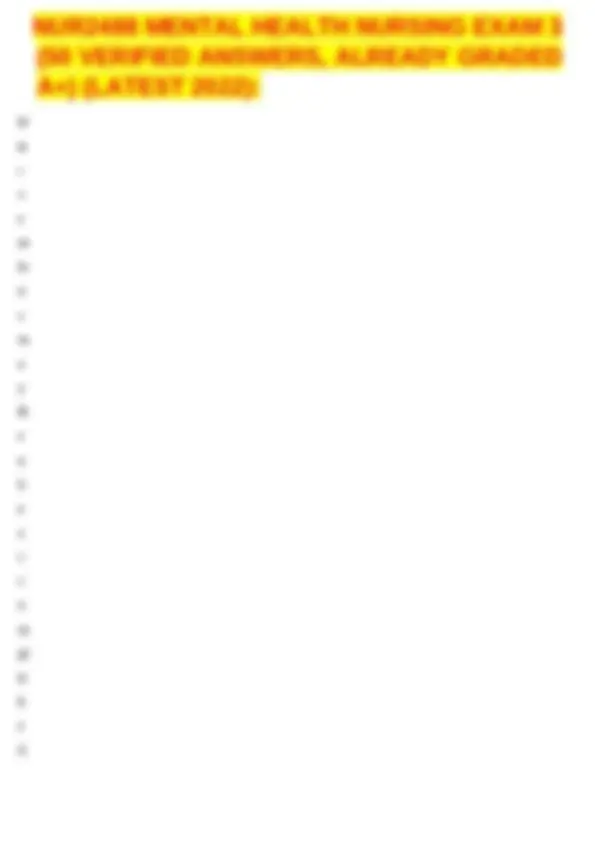
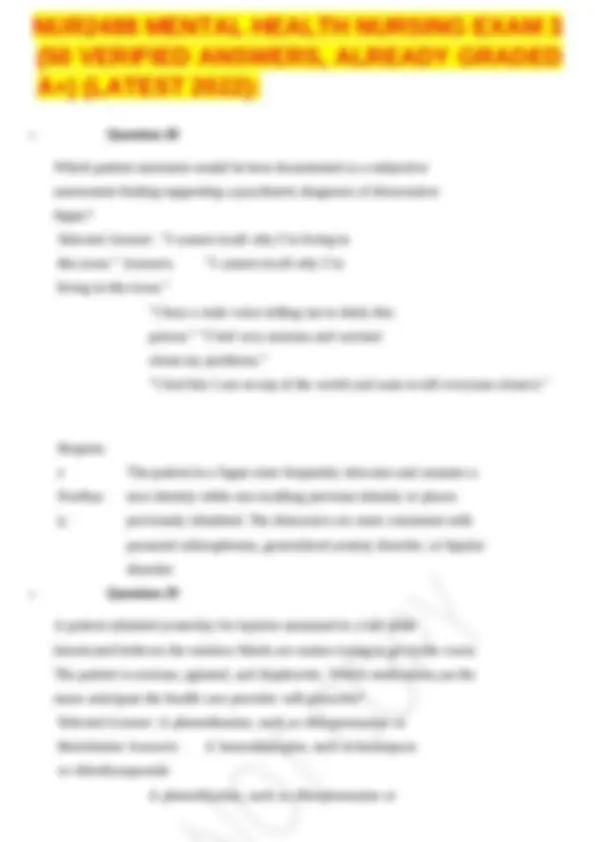
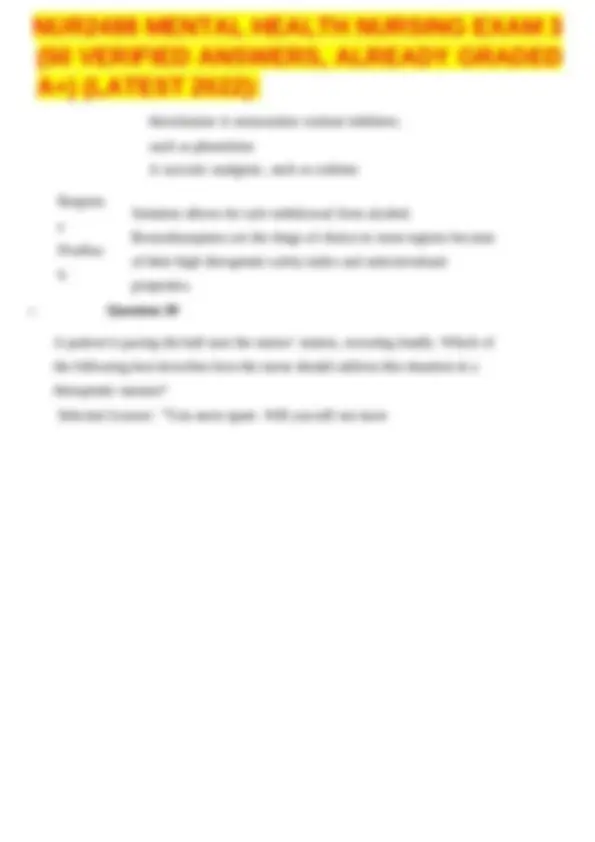
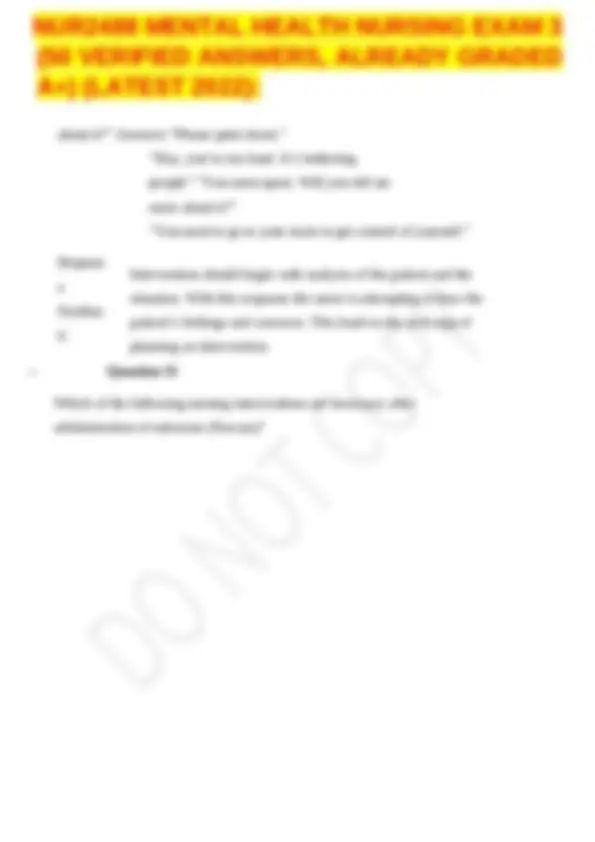
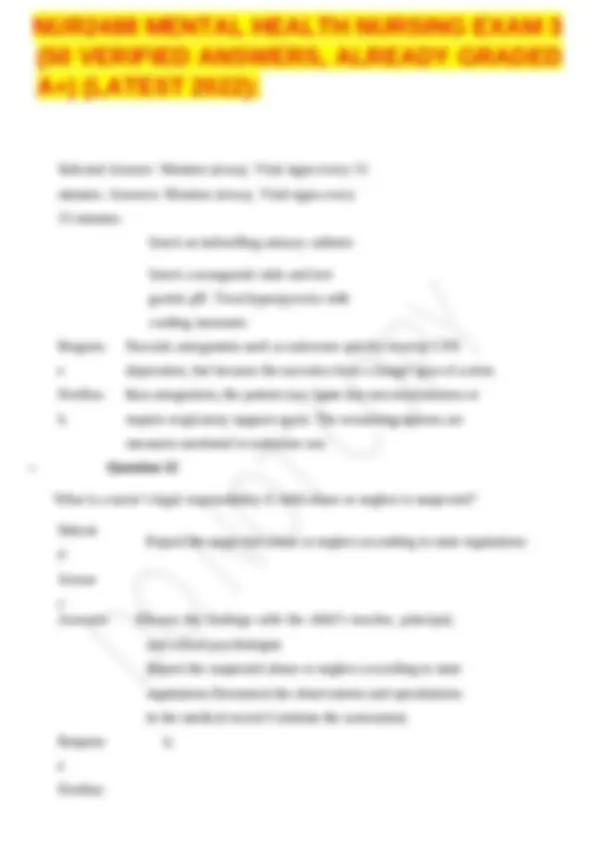
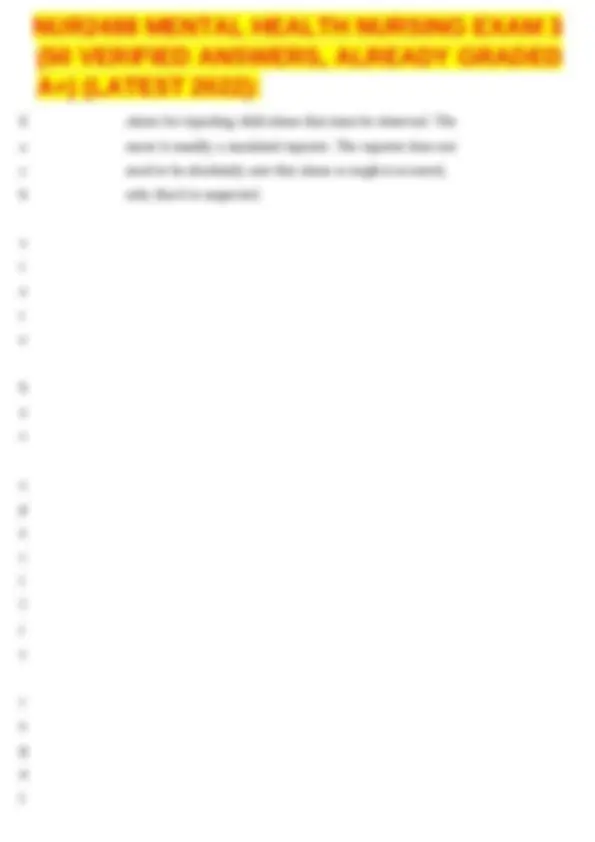
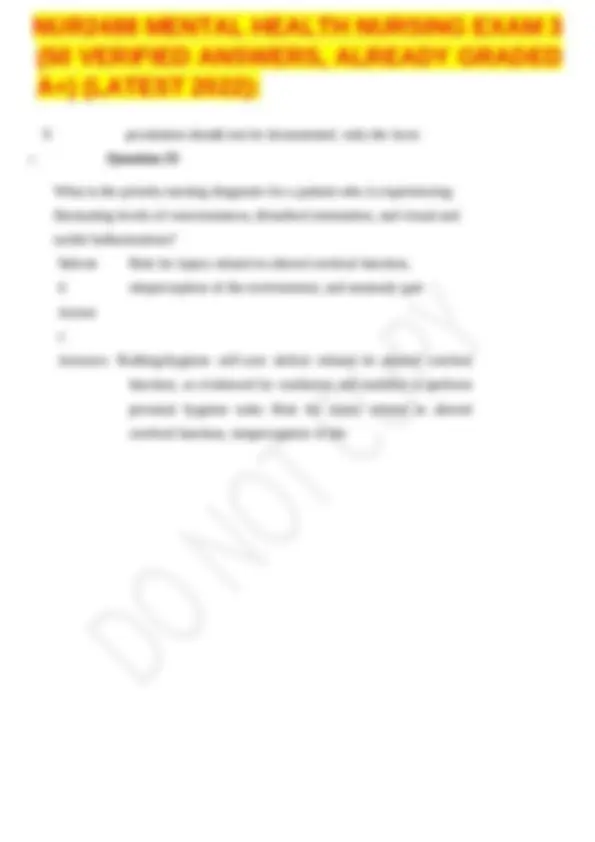
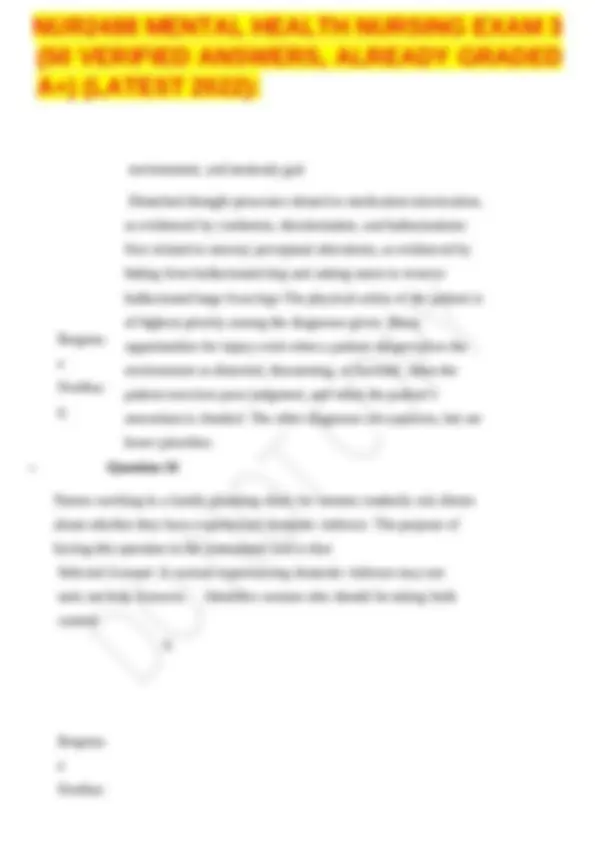
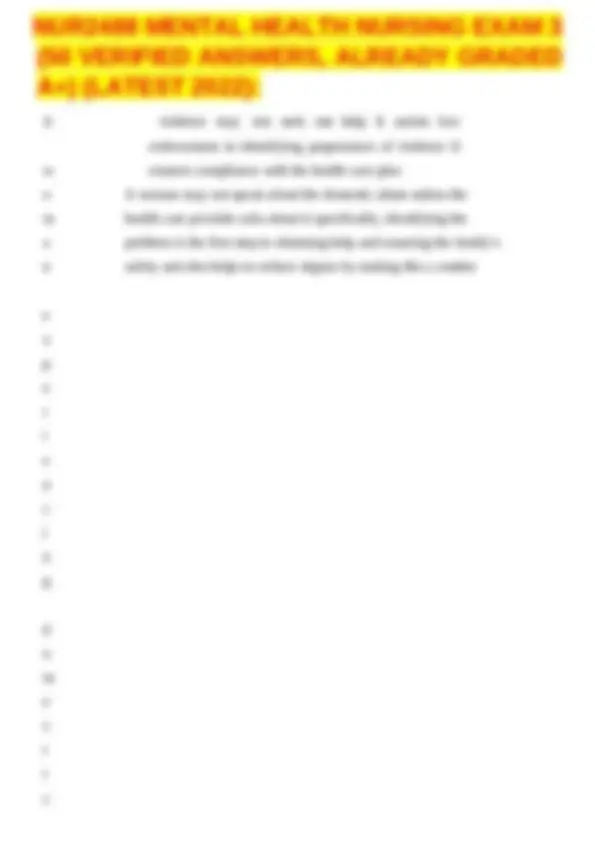
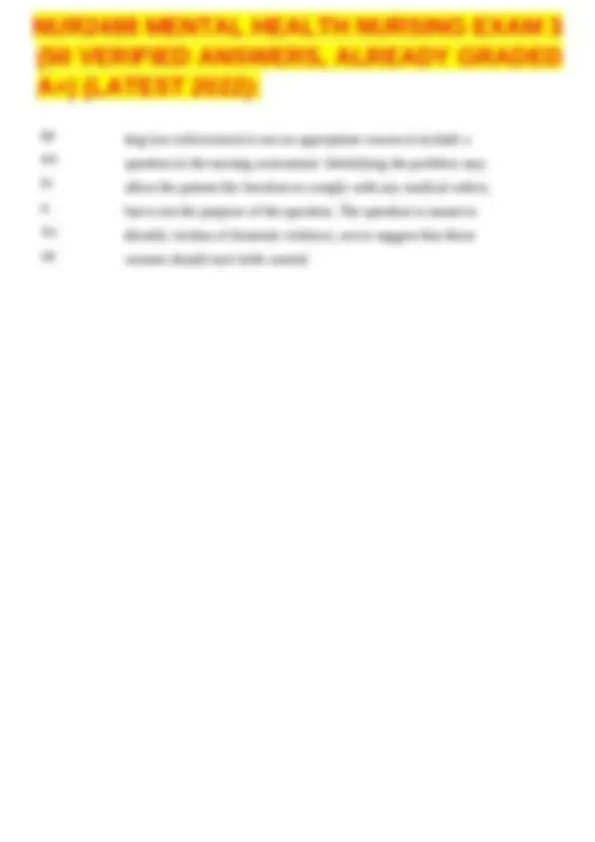
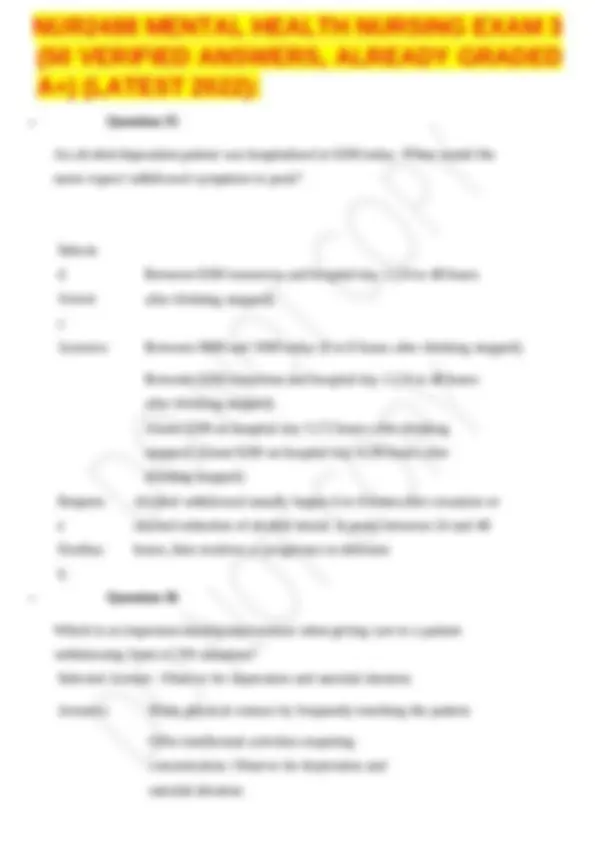
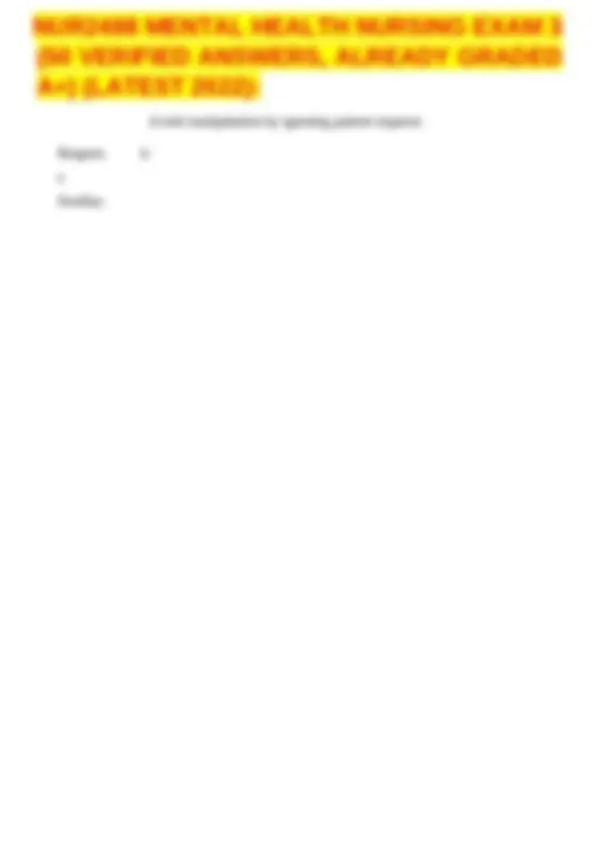
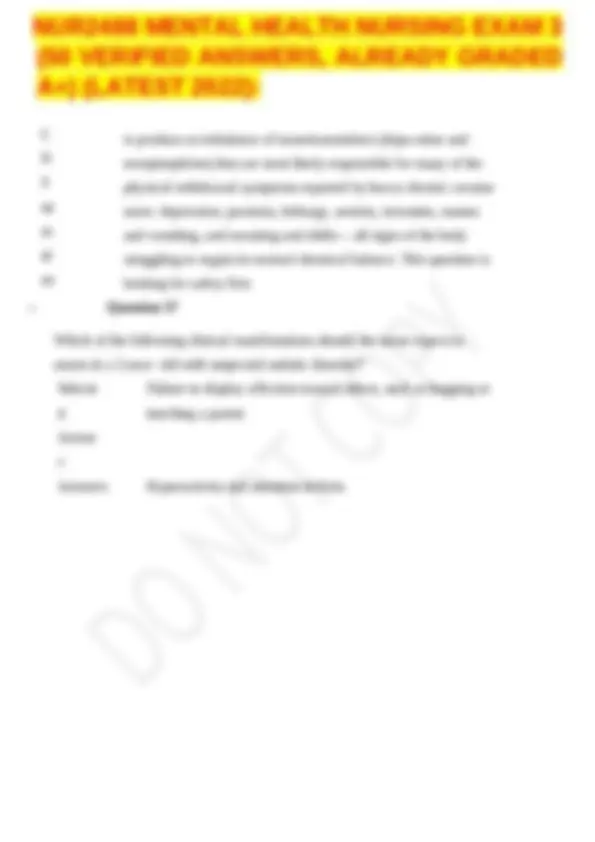
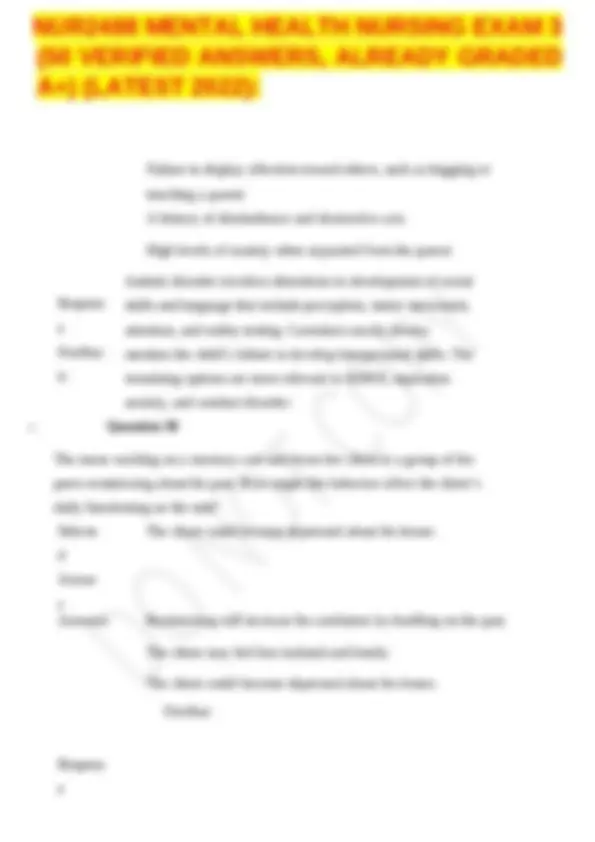
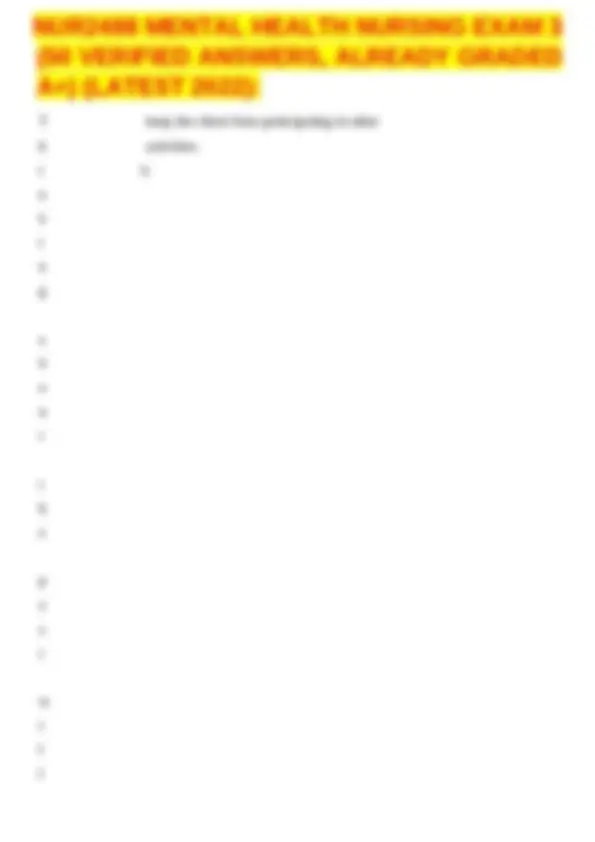
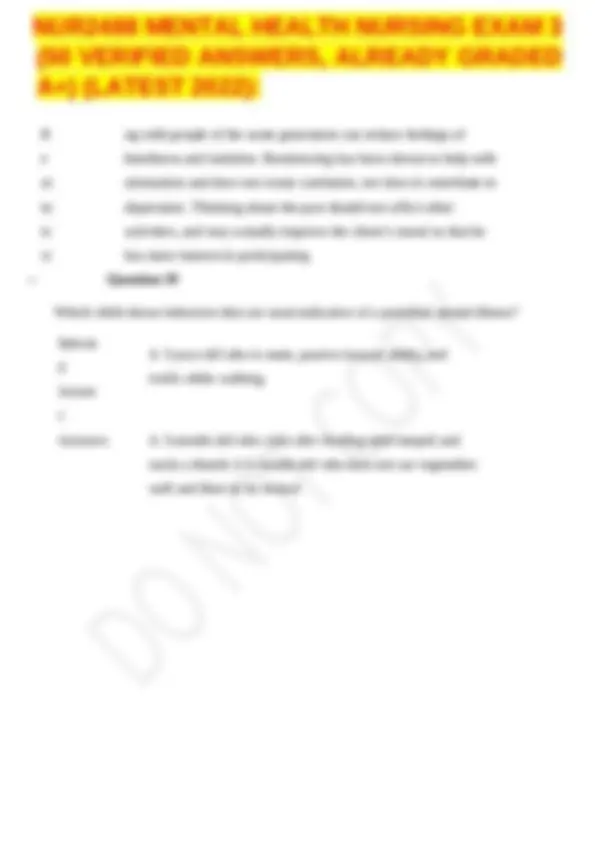
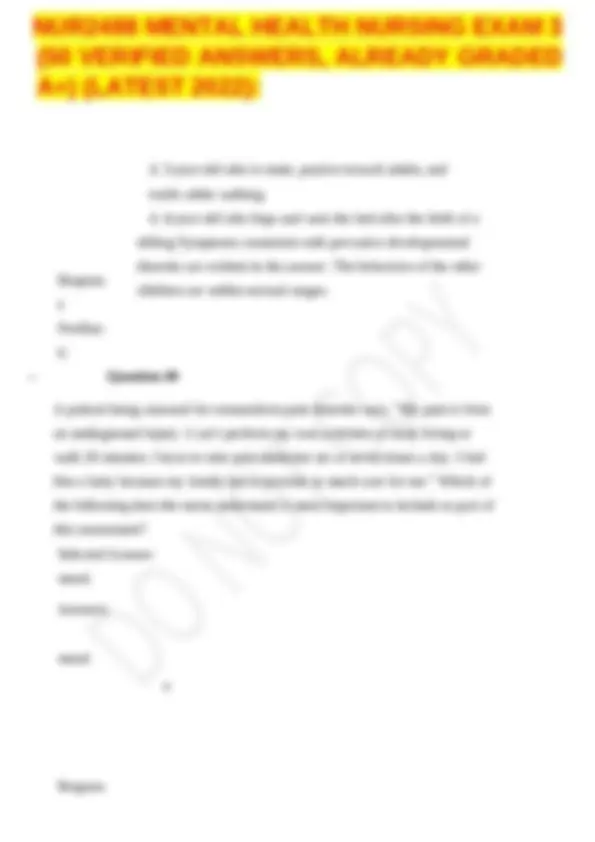
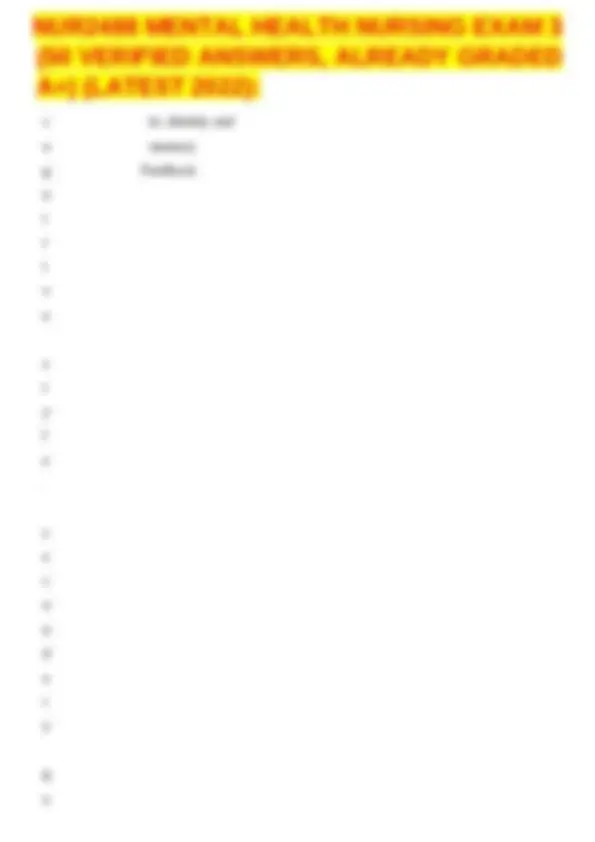
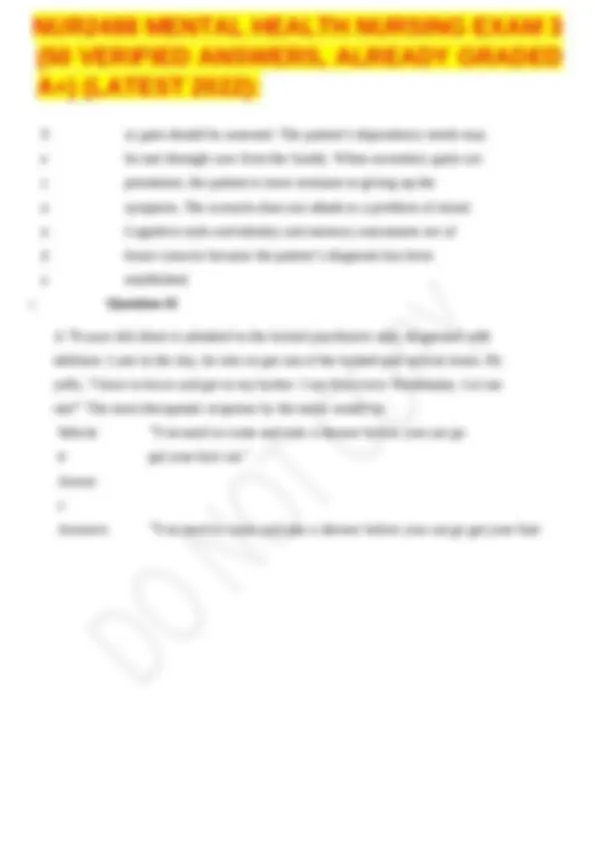
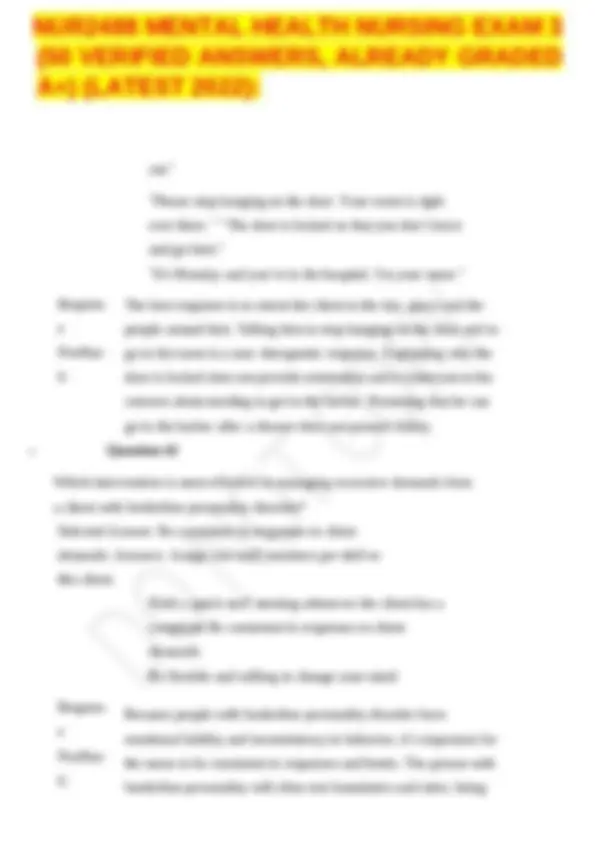
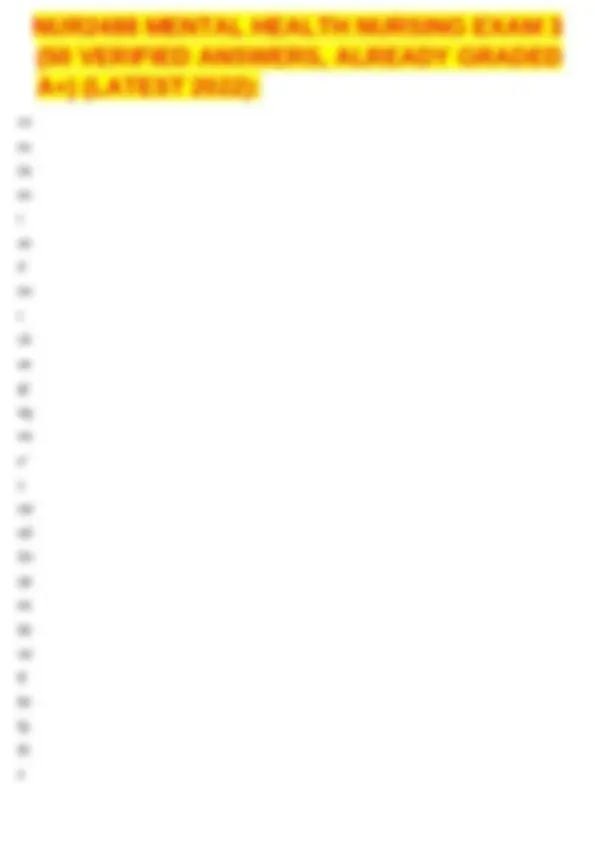
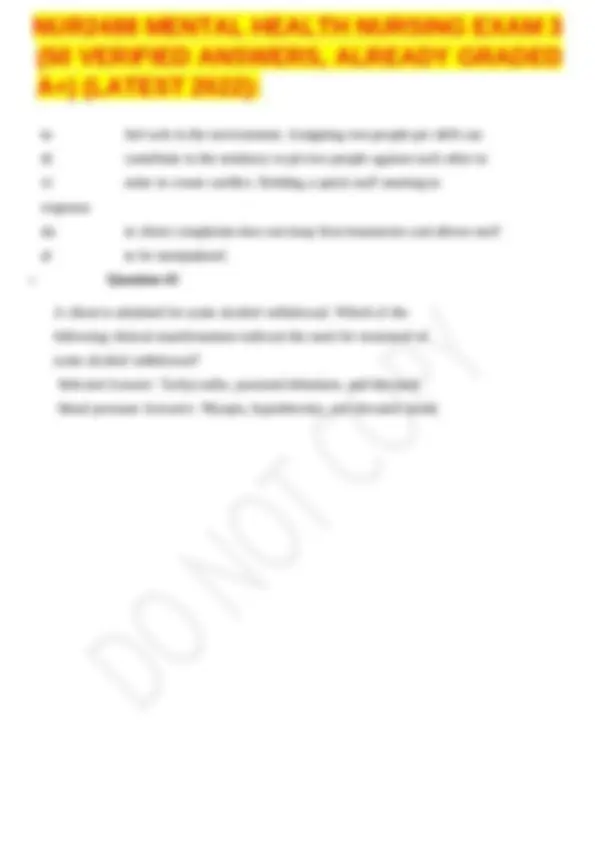
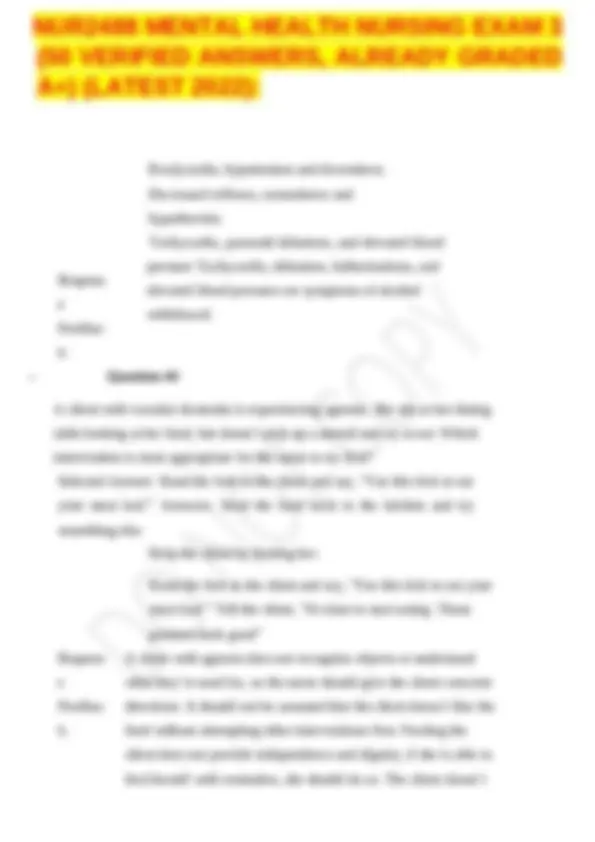
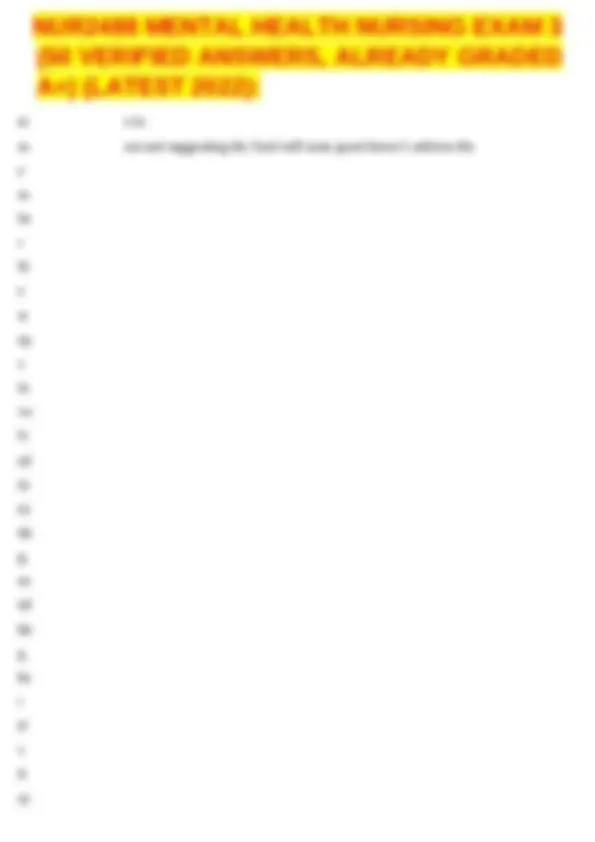
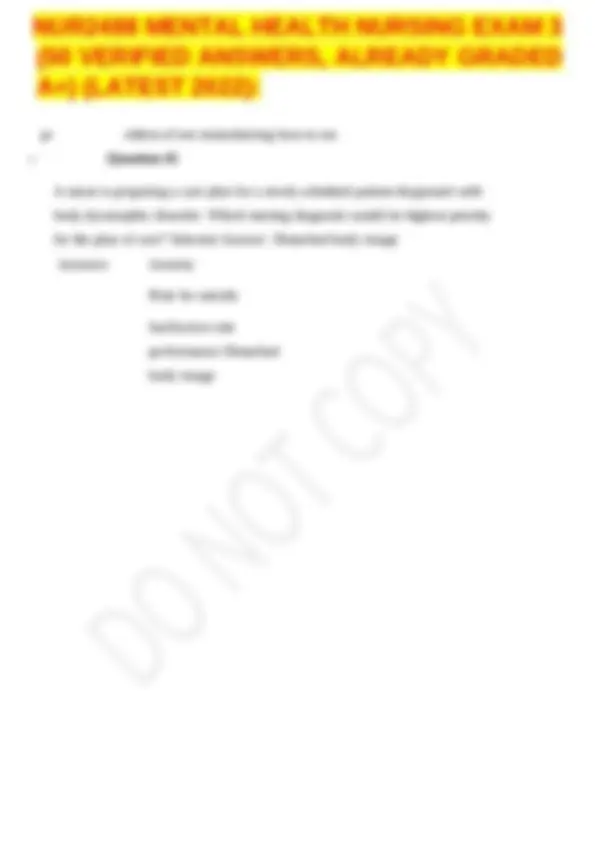
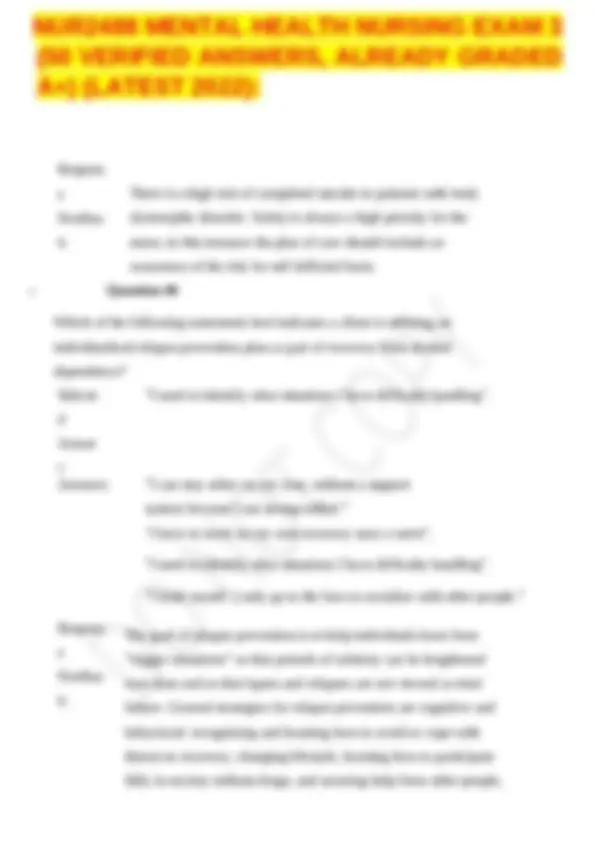
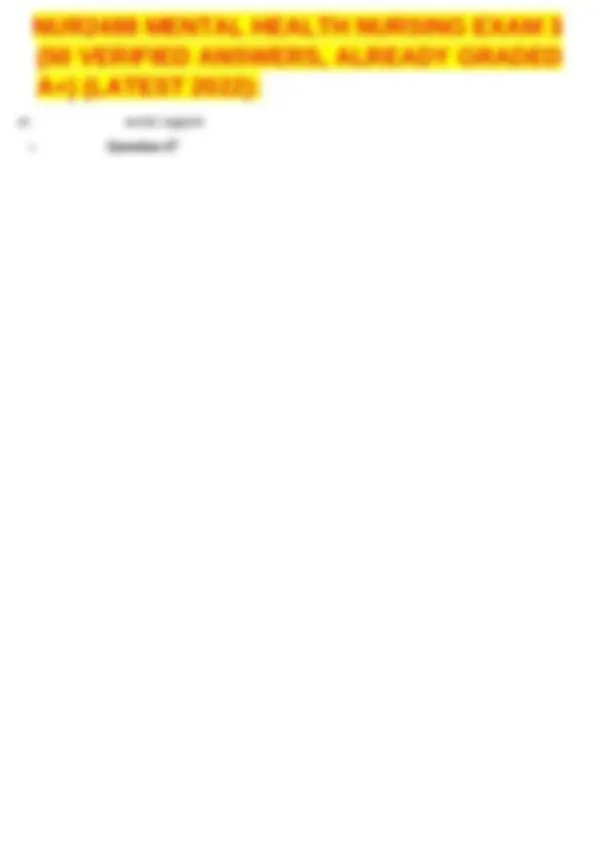
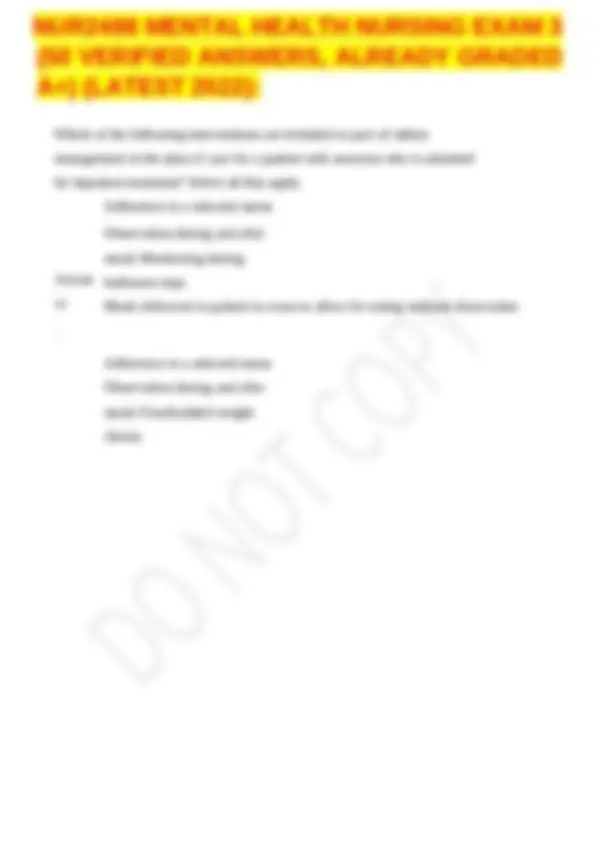
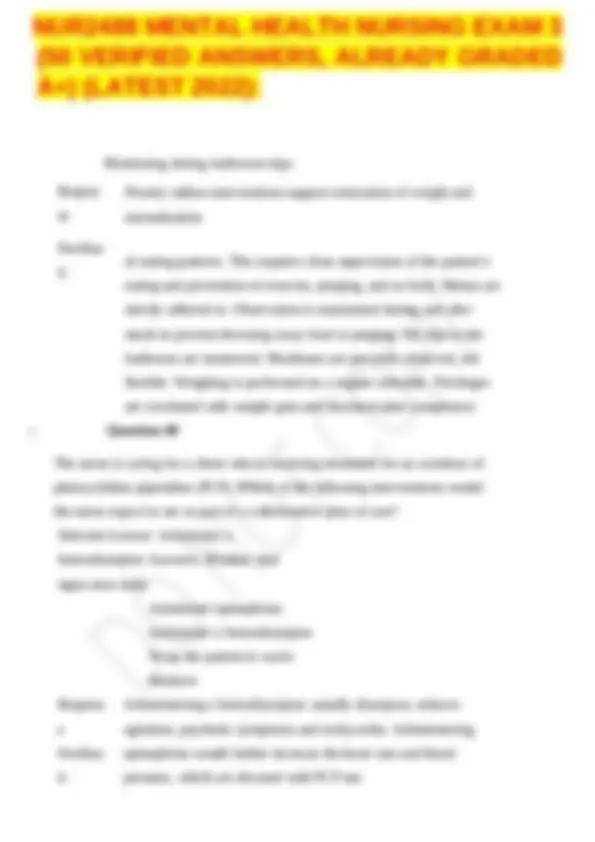
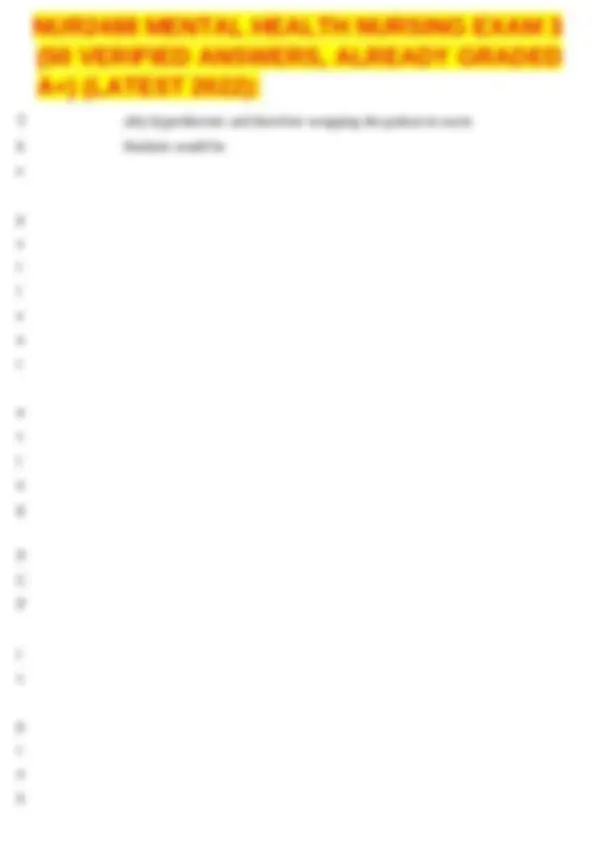
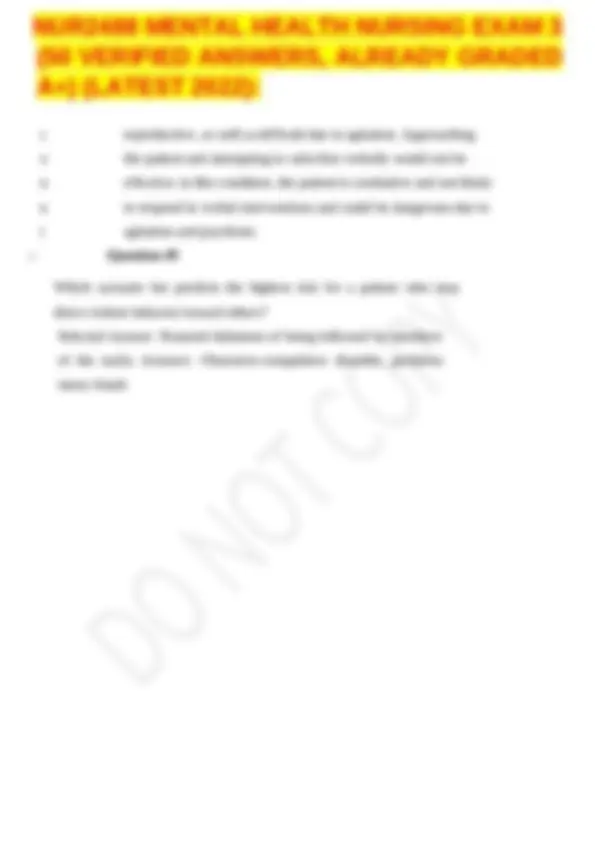
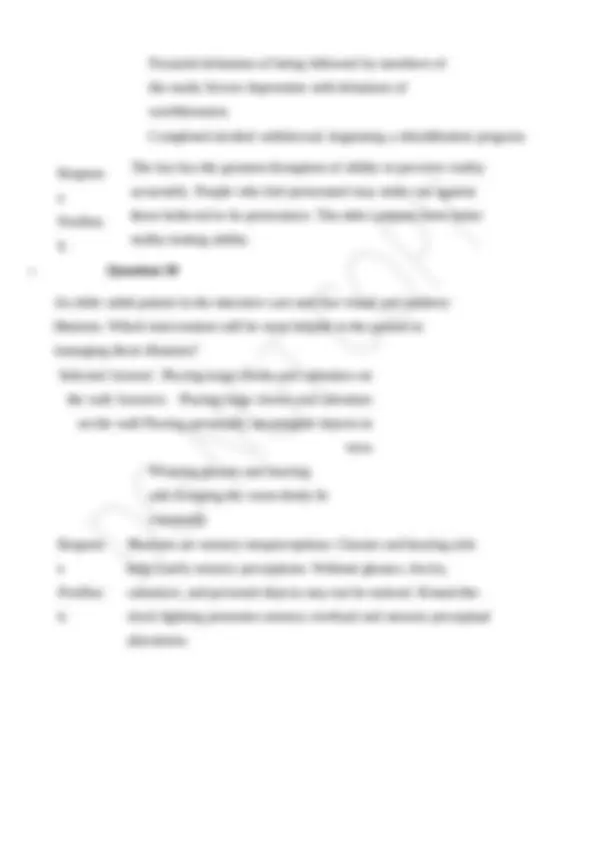


Study with the several resources on Docsity

Earn points by helping other students or get them with a premium plan


Prepare for your exams
Study with the several resources on Docsity

Earn points to download
Earn points by helping other students or get them with a premium plan
Community
Ask the community for help and clear up your study doubts
Discover the best universities in your country according to Docsity users
Free resources
Download our free guides on studying techniques, anxiety management strategies, and thesis advice from Docsity tutors
NUR2488 MENTAL HEALTH NURSING EXAM 3 (50 VERIFIED ANSWERS, ALREADY GRADED A+) (LATEST 2023/ 2024)
Typology: Exams
1 / 58

This page cannot be seen from the preview
Don't miss anything!



















































- Question 1 When a victim of sexual assault is discharged from the emergency department, which of the following interventions should the nurse perform? Answers: Notify the patient’s family of the event to seek support for the patient Provide referral information verbally and in writing Offer to stay with the patient until stability is regained Advise the patient to try not to think about the assault Respons e Feedbac k: Immediately after the assault, rape victims are often disorganized and unable to think well or remember what they have been told. Written information acknowledges this fact and provides a solution. The remaining options violate the patient’s right to privacy, evidence a rescue fantasy, and offer a platitude that is neither therapeutic nor effective. - Question 2 A patient is admitted with a heart rate of 53 bpm, respirations 6/min, temp 96.8 and pinpoint pupils. Based on these clinical manifestations, what substance did this patient most likely overdose on? Answers : Response Feedback:
Opioids A l c o h ol Marijuana Amphetami ne Opioids include prescribed medications such as oxycodone and morphine, and the illegal substance heroin. The above symptoms are typical of opioid overdose, but are not typically seen with marijuana, alcohol or amphetamines.
- Question 3 An elderly client with cognitive impairment is combative and pulled out a nasogastric tube, intravenous line, and indwelling urinary catheter. What can the nurse anticipate that the health care provider will most likely prescribe? Answers: A small dose of a selective serotonin reuptake inhibitor A large dose of a benzodiazepine A maintenance dose of buspirone
A small dose of an atypical antipsychotic Aggressive behavior can be safely managed by antipsychotic medication. Initial dosing should be small and raised cautiously until behavior is controlled. Selective serotonin reuptake inhibitors are not indicated for aggressive behavior. If a benzodiazepine is used, the initial dose should be low. Buspirone is not effective if given on an as-needed basis. It is administered in small divided doses daily to control agitation.
- Question 4
A nursing care plan contains the intervention “monitor for complications of refeeding syndrome.” Which body system should a nurse most closely monitor for clinical manifestations of dysfunction? Answers Renal : Respons e Feedbac k: Central nervous Endocrine Cardiovascul ar Refeeding resulting in too-rapid weight gain can overwhelm the heart, resulting in cardiovascular collapse; thus focused assessment becomes a necessity to ensure patient physiological integrity. The ot r body systems are not initially involved in the refeeding he syndrome.
- Question 5
Which of the following is the best example of all-or-nothing thinking, a
common cognitive distortion of patients with an eating disorder?
Respons e Feedbac k: Detached superficiality during counseling Limits must be set in areas in which the patient’s behavior affects the rights of others. Limiting verbal abuse of another patient is a priority intervention. The other concerns should be addressed during therapeutic encounters.
- Question 7 Which of the following are primary characteristics of a person with borderline personality disorder? Answers : Demonstrates flexibility and compromise Respons e Feedbac k: Demonstrates socially appropriate behaviors Demonstrates eagerness to learn new coping skills Demonstrated a self- defeating cycle of behavior A self-defeating cycle of behavior is a hallmark of borderline personality disorder, creating difficulties is work, social and family relationships. Individuals with a borderline personality are inflexible and do not compromise easily. Socially inappropriate behavior is common in borderline personality, as is an unwillingness to change and learn new coping skills
- Question 8 A nurse is working with a patient with a histrionic personality disorder. Which of the following nursing interventions must be implemented throughout the inpatient stay? Answers Setting appropriate limits on maladaptive behaviors : Offering relationship advice Providing multiple options when the patient makes frequent requests Respons e Feedbac k: Having the patient approach different staff members for interpretation of unit rules Setting firm limits and maintaining consistency are essential elements in working with people with personality disorders. Flexibility and providing too many choices does not help the individual with boundaries and limits. Offering relationship advice is not professional behavior and can have a negative effect on the nurse-client relationship. Encouraging the patient to attend daily activities may be a part of the care plan, but is not as high of a priority as setting limits
- Question 10 A patient is admitted for psychiatric observation after being arrested for breaking windows in the home of a former girlfriend who had refused to see him. His history reveals childhood abuse by a punitive father, torturing family pets, and an arrest for disorderly conduct. Which nursing diagnosis has priority in the plan of care? Answers Risk for injury : Respons e Feedbac k: Post-trauma syndrome Disturbed thought processes Risk for other- directed violence The defining characteristics for Risk for other-directed violence include a history of being abused as a child, having committed other violent acts, and demonstrating poor impulse control. The defining characteristics for the other diagnoses are not present in the scenario
- Question 11 A patient is referred to the mental health center by the family health care provider. Over the past year, the patient has cooked gourmet meals for family members, but eats only tiny portions of the food. The patient wears layers of loose clothing, saying, “It’s just my style.” The patient’s weight has dropped from 130 to 95 pounds. The patient has amenorrhea. Which medical diagnosis are the history and symptoms are most consistent with? Answers : Response Feedback: Anorexia nervosa B u l i m i a nervosa Binge eating Eating disorder not otherwise specified Overly controlled eating behaviors, extreme weight loss, amenorrhea, preoccupation with food, and wearing several layers of loose clothing to appear larger are part of the clinical picture of an individual with anorexia nervosa. The individual with bulimia usually is near normal weight. The binge eater is often overweight. The patient with eating disorder not otherwise specified may be obese.
- Question 13 A patient referred to the eating disorders clinic has lost 35 pounds during one summer. Which of the following questions would be best if the nurse wished to assess the patient’s eating patterns? Answers : Respons e Feedback: “Do you often feel fat?” “ W h o plans the family meals?” “What do you eat in a typical day?” “What do you think about your present weight?” Although all the questions might be appropriate to ask, only “What do you eat in a typical day?” focuses on the patient’s eating patterns. Asking if the patient often feels fat focuses on distortions in body image. Questions about family meal planning are unrelated to eating patterns. Asking for the patient’s thoughts on present weight explores the patient’s feelings about weight.
Question 14 A patient with a history of cocaine use reports a concurrent history of using other drugs in order to counteract the effects of cocaine. Which drug is this patient likely to have abused? Methylphenidate Caffeine Alcohol is a depressant which can neutralize the effects of cocaine, which is a stimulant. Caffeine, methylphenidate (used to treat ADHD) and the illegal drug PCP are also stimulating and would only exacerbate the effects of cocaine. e Feedback:
- Question 15
A patient admitted for a heroin overdose received naloxone, which improved her breathing pattern. Two hours later the patient reports muscle aches, abdominal cramps, and gooseflesh, and says, “I feel terrible.” Which is the correct analysis of this assessment? Selected Answer: The patient should be monitored closely for seizures Answers: A peculiar reaction to naloxone is occurring Respons e Feedbac k:
- Question 16 A health care provider writes these new prescriptions for a nursing home resident: 2-g sodium diet; restraints as needed for behavioral problems; limit fluids to 2000 mL daily; continue antihypertensive medication; milk of magnesia 30 mL orally one time as needed if no bowel movement for 3 days. Which of the following is most appropriate for the nurse to do first? Selected Answer: Clarify the order for restraints Answers: Clarify the order for fluid restriction Clarify the order for restraints Transcribe all orders as written Clarify the order for milk of Respons e Feedbac k:magnesia Restraints may be imposed only on the written order of the health care provider that specifies the duration during which the restraints can be used. The Joint Commission guidelines and Omnibus Budget Reconciliation Act regulations also mandate a number of other conditions that must be considered and documented before restraints are used. The other orders would be considered appropriate for implementation. - Question 17 The son of an elderly client with dementia is talking to the nurse about discharge. He indicates that his father’s physician has given him 48 hours to decide on a living situation. The nurse discusses possible living arrangements and provides contact information. The nurse knows that the son requires further teaching when he says:
Selecte d Answe r:I want the social worker to decide if he should stay home or go to assisted living so he doesn’t blame me. Answers: I have quite a decision to make. Respons e Feedbac k:I want the social worker to decide if he should stay home or go to assisted living so he doesn’t blame me. Well I guess we can try him at home and if it doesn’t work out, I can move him to assisted living later. I think Dad would rather be at home and I think my sister and I can do it. We’ll talk to this home care agency. The son is avoiding making a decision and taking responsibility if he states that he wants the social worker to make the decision. Admitting that he has a difficult decision to make, realizing that he can change the living situation when needed, and making a decision to try home care are all healthy comments in this situation and show that he is accepting responsibility and is willing to make a decision.
- Question 18 A child with ADHD will begin medication therapy. Which of the following classifications of medications should the nurse prepare to teach the patient and family about? Selected Answer: Central nervous system stimulants Answers: Central nervous system stimulants Monoamine oxidase inhibitors (MAOIs) Antipsychotic medications Respons e Feedbac k:
Respons e Feedbac k: Imply that somatic symptoms are not real. Help the patient suppress feelings of anger. Assess for objective data to support the patient’s report of each physical symptom. Physical symptoms need to be investigated with the first patient encounter to rule out an underlying medical condition as cause of the reported symptoms; however, they do not need to be re- investigated each time the patient reports them. Shifting the focus from somatic symptoms to feelings or to neutral topics conveys interest in the patient as a person rather than as a condition, but this is accomplished after ruling out a serious medical condition. The need to gain attention with the use of symptoms is reduced over th term. A desired outcome would be that patient would express e feelings, including anger if it is present. Once physical symptoms lo have been investigated, they do not need to be reinvestigated each ng time the patient reports them.
- Question 20 The nurse is assessing a patient who has been diagnosed with hypochondriasis. Which clinical manifestation would the nurse most likely assess in this patient? Selected Answer: Misinterpretation of physical sensations as evidence of serious illness Answers: Loss of interest in formerly pleasurable activities
Repetitive, time-consuming rituals Respons e Feedbac k: Deliberate fabrication of symptoms for an obvious benefit Misinterpretation of physical sensations as evidence of serious illness People with hypochondriasis experience severe distress, and their ability to function in personal, social, and occupational roles often is impaired. Most patients with hypochondriasis present with somatic symptoms as well as total preoccupation with the belief of having a devastating sickness or disease. These individuals are thought to have prominent health anxiety (hypochondriasis), another form of hypochondriasis. They have minimal or no somatic symptoms but reveal a disproportionate or excessive preoccupation with having a serious illness.
- Question 21 While providing health teaching for a patient with binge-purge bulimia, what information is most important for the nurse to prioritize? Selected Answer: self-esteem maintenance Answers: self-monitoring of daily food and fluid intake establishing the desired daily weight gain symptoms of hypokalemia self-esteem maintenance